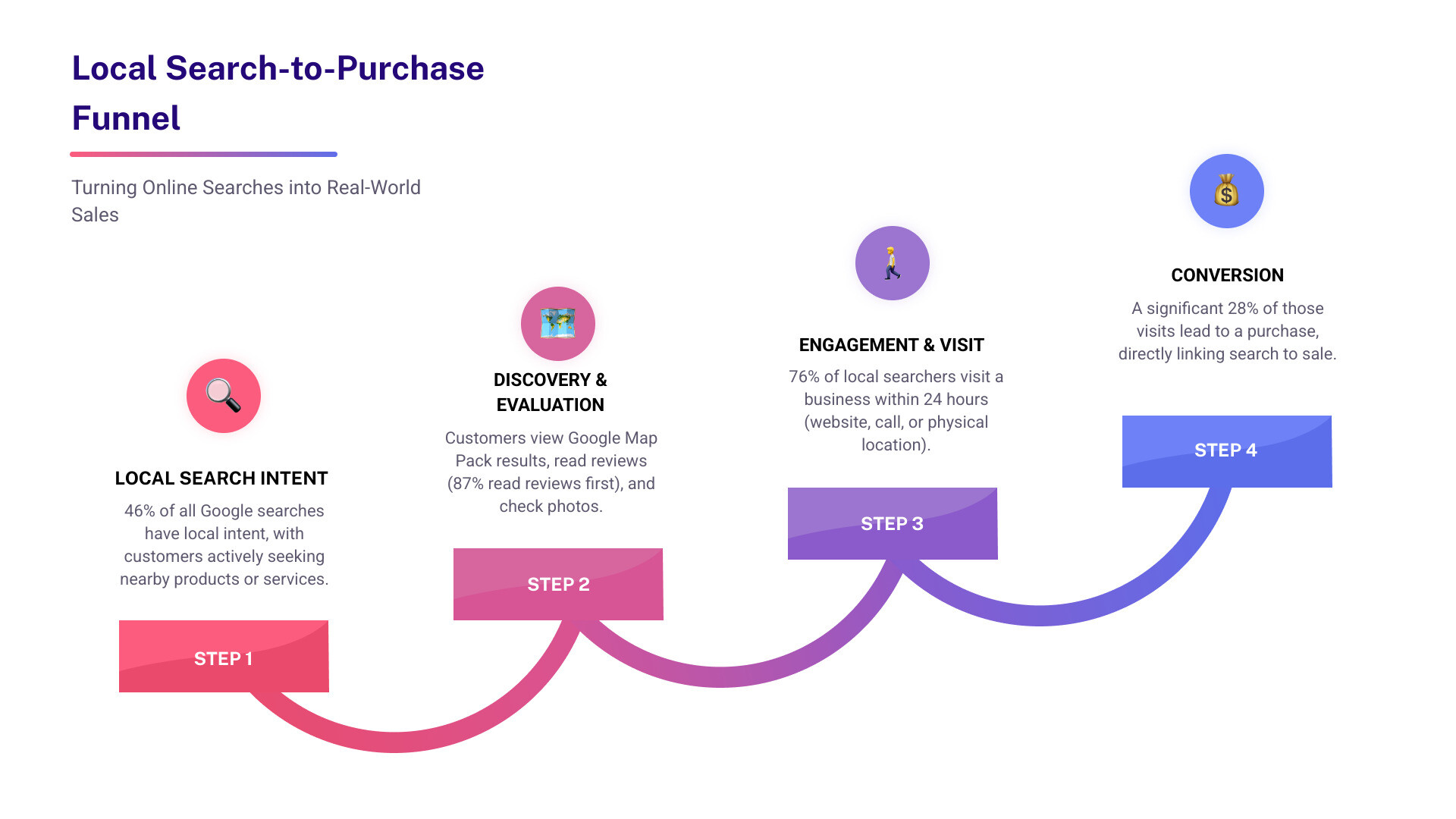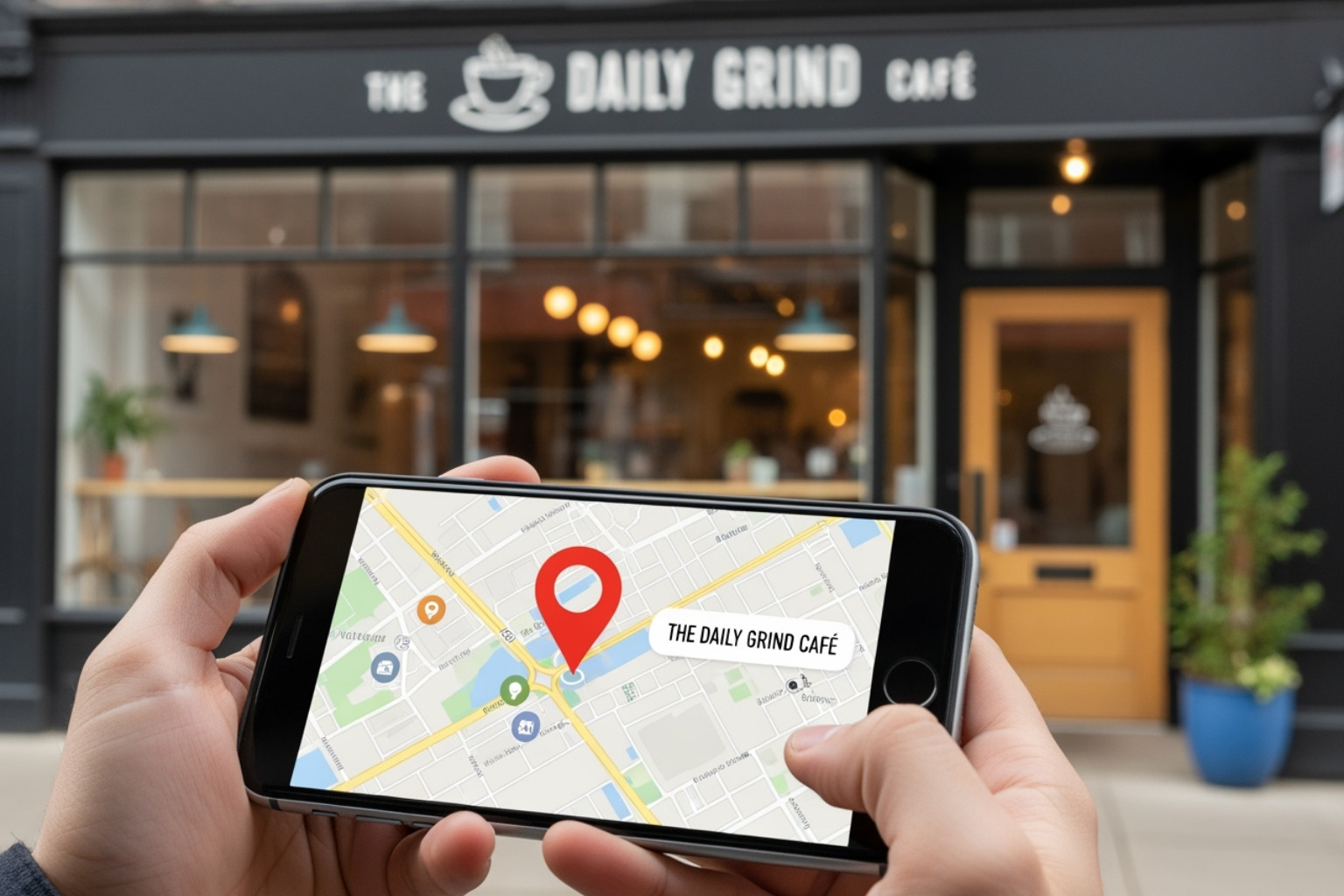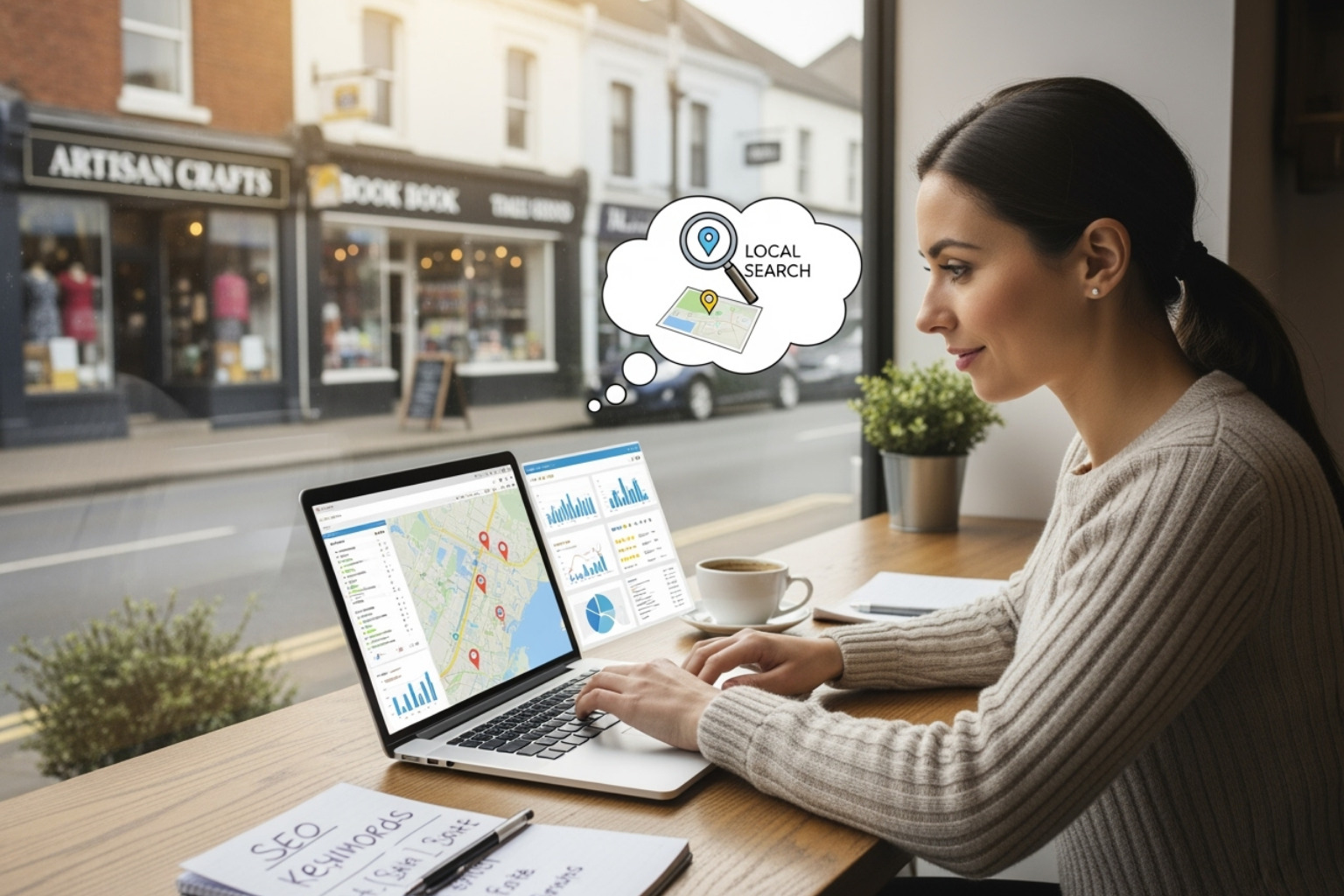Local SEO for Small Businesses: 3 Game-Changers
Why Your Neighbors Can’t Find You Online (And How to Fix It)
Local SEO for small businesses is the process of optimizing your online presence to attract customers searching for products or services near them. Here’s a quick overview:
Quick Answer: What is Local SEO?
- Optimize your Google Business Profile – Your free digital storefront in Google Maps and local search.
- Build consistent local citations – Ensure your business name, address, and phone number (NAP) match everywhere online.
- Collect and respond to reviews – 87% of consumers read online reviews before choosing a local business.
- Create location-specific content – Use local keywords on your website to signal relevance.
- Focus on mobile optimization – 75% of local searches happen on mobile devices.
Why It Matters Right Now:
- 46% of all Google searches have local intent.
- 76% of people who search locally visit a business within 24 hours.
- 28% of those visits result in a purchase.
Your competition isn’t just down the street—it’s every business online. When someone searches “coffee shop near me” or “plumber in Canton,” you’re either showing up or you’re invisible.
The good news? Local SEO levels the playing field. You don’t need a massive marketing budget to outrank bigger competitors. You need the right strategy to reach customers who are already looking for you in your neighborhood. This guide will show you how to claim your spot at the top of local search, drive more foot traffic, and turn searches into sales.

What is Local SEO and Why Is It a Game-Changer?
Imagine you own a bakery in downtown Canton. When locals search “bakery near me,” does your business appear? If not, you’re invisible to nearby customers ready to buy. That’s the problem local SEO for small businesses solves.
Local SEO is your strategy for making sure nearby customers find you online. It involves optimizing your entire digital presence—from your website to your Google Business Profile—to appear when someone in your area needs what you offer. For small businesses, this is a game-changer. You’re not competing with national chains; you’re focusing on serving your local community.
The numbers prove its power: 76% of people who search locally visit a business within a day, and 28% of those visits lead to a purchase. That’s a direct line from a search to your front door.

Google’s goal is simple: connect people with the best nearby businesses. It uses three main factors to rank local businesses:
- Relevance: How well your business matches the search query. If a customer types “vegan bakery,” Google shows them vegan bakeries. Choosing the right business categories on your profiles is crucial.
- Distance: How close your business is to the searcher’s location. For “near me” searches, proximity is a primary factor.
- Prominence: How well-known and trustworthy your business is online. This is influenced by online reviews, mentions of your business across the web (citations), and your overall digital reputation. A business with 200 five-star reviews will naturally rank higher than one with only a few.
You can’t pay for a better spot, but you can improve each of these factors through consistent effort. For Google’s own advice, check out this video: How to improve your local ranking on Google.
Understanding the Key Differences: Local vs. General SEO
Local and general SEO share the goal of getting found online, but they use different paths.
| Feature | General SEO | Local SEO |
|---|---|---|
| Geographic Targeting | National or global audience | Specific geographic area (city, neighborhood) |
| Search Intent | Informational, transactional | Highly transactional, “near me,” immediate needs |
| Ranking Signals | Website authority, backlinks | Google Business Profile, reviews, NAP consistency, distance |
| Keyword Focus | Broad keywords | Geo-modified keywords (e.g., “plumber Canton OH”) |
| Results Display | Organic blue links | Map Pack (top 3 listings), local organic results |
General SEO casts a wide net, ideal for e-commerce stores or national blogs. Local SEO for small businesses is laser-focused on attracting customers in your immediate area who are ready to act. These are people searching “emergency plumber Canton OH” or “dentist open Saturday near me.”
The search results also look different. Local searches often feature the Map Pack—the top three business listings with a map. This prime real estate appears above regular organic results, making it incredibly valuable. Your goal is to land in that top three.
The Core Pillars of Local SEO for Small Businesses
Building a strong local SEO for small businesses presence requires a solid foundation. These core pillars work together to signal to customers and search engines that your business is trustworthy, relevant, and ready to serve the local community.

Pillar 1: Master Your Google Business Profile (GBP)
Your Google Business Profile is the most powerful tool in your local SEO arsenal. It’s your key to appearing in the local map pack, on Google Maps, and in local search results.
- Claim and Verify: First, Manage your business to prove you’re the owner. Verification is usually a quick process via email, text, or phone.
- Ensure NAP Consistency: Your Name, Address, and Phone number (NAP) must be identical everywhere online, character for character.
- Choose the Right Categories: Select a primary category that best describes your core business, then add specific secondary categories. Accuracy is key.
- Write a Compelling Description: Explain what makes your business special, naturally weaving in keywords customers use to find you. Use a tool like Google Keyword Planner to find these terms.
- Upload High-Quality Photos: Show off your storefront, interior, products, and team. Profiles with photos get more clicks and direction requests.
- Use Google Posts: Share updates, offers, and events to keep your profile fresh and signal to Google that you’re active.
A fully optimized GBP dramatically increases your chances of landing in the coveted map pack. For a deeper dive, learn more about GMB Optimization Services.
Pillar 2: Build Trust with Reviews and Citations
Your online reputation is everything in local SEO. 87% of consumers read online reviews before making a decision, and Google’s algorithm takes notice.
- Ask for Reviews: Train your team to ask satisfied customers for a review. Make it easy by providing a direct link.
- Respond to All Reviews: Thank customers for positive feedback and address negative reviews professionally. Responding shows you care and builds trust with potential customers.
- Build Local Citations: A citation is any online mention of your business’s NAP. They appear on directories, social media, and industry-specific sites.
- Maintain NAP Consistency: Your business information must be identical across all citations. Even minor differences (“Street” vs. “St.”) can confuse search engines. For more on this, see our guide to Google Local Citations.
- Get Listed in Key Directories: Start with major platforms like Yelp, Yellow Pages, your Facebook Business Page, Bing Places for Business, and Apple Maps Connect. Also, target your local Chamber of Commerce and relevant industry-specific directories.
Pillar 3: Optimize Your Website for Local Search
Your website is your digital storefront. It must be welcoming, informative, and optimized for local customers.
- On-Page SEO Basics: Include local keywords in your meta titles, descriptions, and headings. Display your NAP and business hours prominently, often in the footer. Embed a Google Map.
- Prioritize Mobile: With 75% of local searches happening on mobile, your site must have a responsive design that works flawlessly on any screen.
- Boost Website Speed: A slow site drives customers away. Optimize images, use browser caching, and choose reliable hosting to ensure your site loads in under three seconds.
- Create Location-Specific Pages: If you serve multiple areas, like Canton and North Canton, create a unique page for each. Include local keywords, testimonials, and a map for that specific area.
- Use Schema Markup: Add local business schema code to your site to help search engines understand your information. This can create “rich snippets” in search results, highlighting your hours, reviews, and services. Learn more at schema.org.
Your website and GBP work together to create a comprehensive local presence. Learn more about how SEO and GMB are connected.
Advanced Strategies and Measuring Your Success
With a strong foundation, you can take your local SEO for small businesses to the next level. These advanced strategies will help you build authority and track your performance for continuous improvement.

Boosting Authority with Local Link Building and Content
Links from other local websites act as votes of confidence, telling Google your business is a trusted part of the community.
- Leverage Local Partnerships: If you supply another local business, ask for a link from their website.
- Sponsor Community Events: Sponsoring a local team, charity run, or festival often earns you a link from the event’s website and shows community commitment.
- Guest Post on Local Blogs: Share your expertise on local news or lifestyle sites. A landscaper could write “Prepping Your Canton Garden for Winter” for a local blog, earning a valuable backlink.
- Create Geo-Targeted Content: Write blog posts about local news, events, or issues relevant to your customers. A plumber might post about “How North Canton’s Hard Water Affects Your Pipes,” naturally incorporating local keywords.
These strategies are especially effective for service-based industries, as explored in this guide for a Contractor SEO Agency.
Common Mistakes to Avoid in Local SEO for Small Businesses
Many well-intentioned businesses make simple mistakes that hurt their rankings. Avoid these common pitfalls:
- Inconsistent NAP Information: Your Name, Address, and Phone number must be identical everywhere. Audit your listings regularly.
- Ignoring Online Reviews: Failing to respond to reviews makes you look disengaged. 88% of people use businesses that respond to reviews.
- Keyword Stuffing: Don’t force keywords into your content. Write for humans first, not search engines.
- Neglecting Mobile Optimization: With 75% of local searches on phones, a poor mobile experience is like locking your doors during business hours.
- Using Incorrect GBP Categories: Be as specific as possible with your Google Business Profile categories to attract relevant searches.
Measuring Success: Key Metrics for Local SEO for Small Businesses
Tracking your performance is essential to understanding what’s working. Focus on these key metrics:
- Google Business Profile Insights: This free dashboard shows how customers find you (direct vs. findy searches) and what actions they take. Track calls, website clicks, and direction requests to measure real-world engagement.
- Keyword Rankings: Use a rank tracking tool to monitor your position for important local search terms like “HVAC repair Canton OH.” This helps you spot trends and adjust your strategy.
- Google Analytics: Analyze your website traffic to see how many visitors come from your target area. Monitor metrics like bounce rate and time on page to gauge if your content is resonating with local searchers.
Reviewing these metrics monthly tells a story. High GBP views but low clicks might mean your photos or description need work. High website traffic but a high bounce rate could signal a poor mobile experience.
Frequently Asked Questions about Local SEO
How long does it take to see results from local SEO?
Local SEO is a long-term strategy, not an overnight fix. While you might see some quick wins from optimizing your Google Business Profile within a few weeks (like more calls or direction requests), plan on 3-6 months for substantial, lasting results. The timeline depends on factors like your industry’s competitiveness, your location, and the consistency of your efforts. Patience and persistence are key.
Can I do local SEO myself or should I hire an agency?
DIY local SEO is possible, especially if you have the time to learn and implement the strategies in this guide. Free tools like Google Business Profile and Google Analytics provide a solid starting point.
However, running a business is demanding. A professional agency brings specialized expertise, advanced tools, and knowledge of the latest algorithm updates. They can often accelerate results and free you up to focus on your customers. For businesses in competitive markets, an agency can be the difference between stagnation and growth. MDM Marketing, based in North Canton, OH, offers data-driven local SEO for small businesses custom to your specific needs.
What is the most important first step for local SEO?
If you do only one thing, claim and fully optimize your Google Business Profile (GBP). This is the absolute foundation of your local online presence. Your GBP is your free digital storefront that appears in the map pack and on Google Maps, where most local customers will find you. Fill out every section completely and accurately, upload high-quality photos, and start encouraging and responding to reviews. Getting your GBP right will have the most significant and immediate impact on your local visibility.
Conclusion: Your Path to Local Dominance
In today’s market, local SEO for small businesses isn’t optional—it’s essential for growth. It’s the difference between being found by customers in your neighborhood and watching them go to your competitors. From optimizing your Google Business Profile to building local trust with reviews and creating a mobile-friendly website, each piece works together to turn online searches into real-world sales.
The digital landscape is always evolving with trends like voice search and AI-driven results. The businesses that adapt and maintain a sharp local SEO strategy will be the ones to dominate their local markets.
You don’t have to figure this out alone. Right now, someone in your neighborhood is searching for what you offer. Will they find you?
If you’re ready to stop being invisible and start owning your local market, MDM Marketing can help. Based in North Canton, OH, we specialize in data-driven SEO strategies that connect with your customers. We know the local landscape because we’re part of it.
Start growing your local presence with us and take the first step toward local dominance today.
About The SEO Experts at MDM Marketing
This author hasn't written a bio yet.
